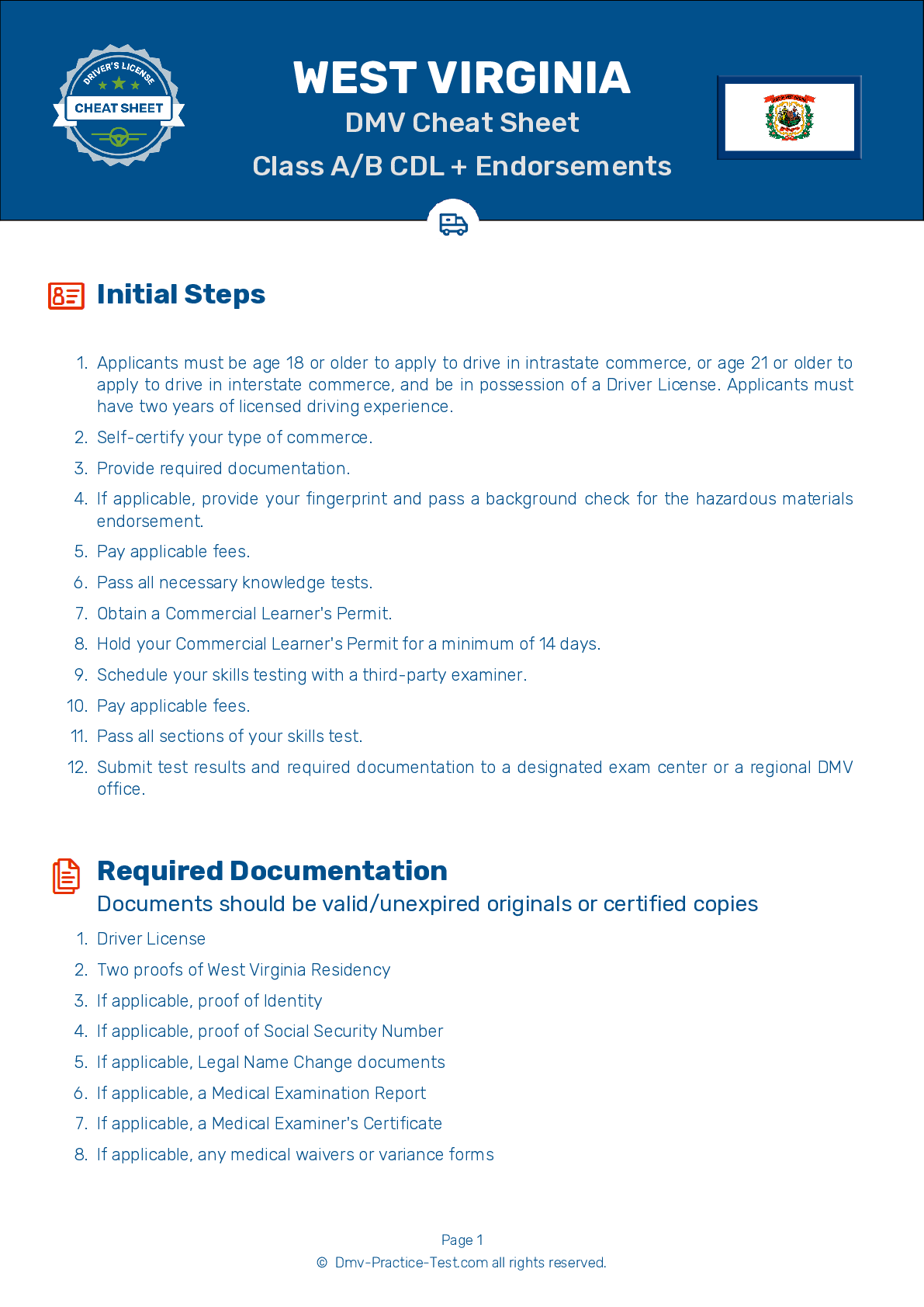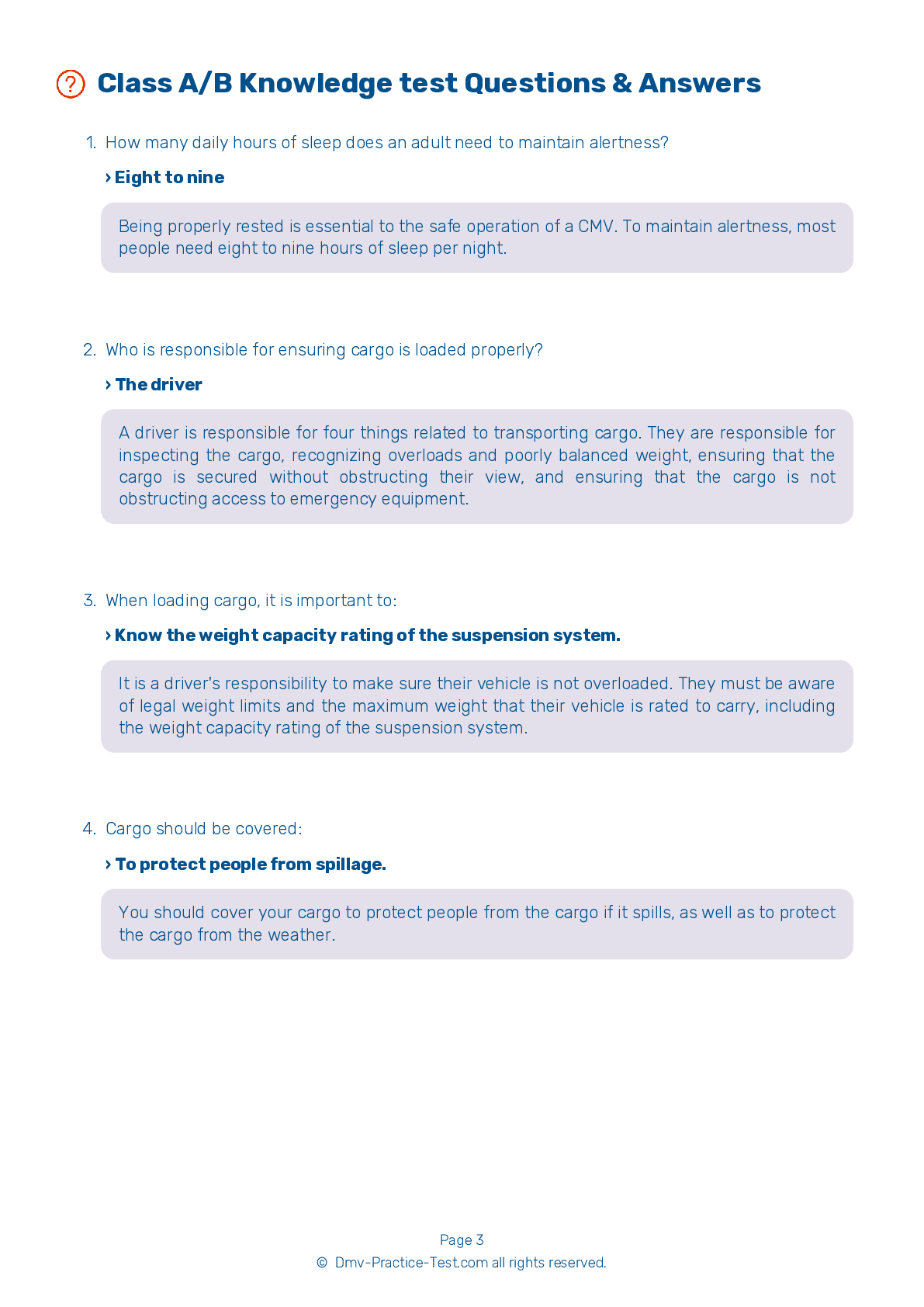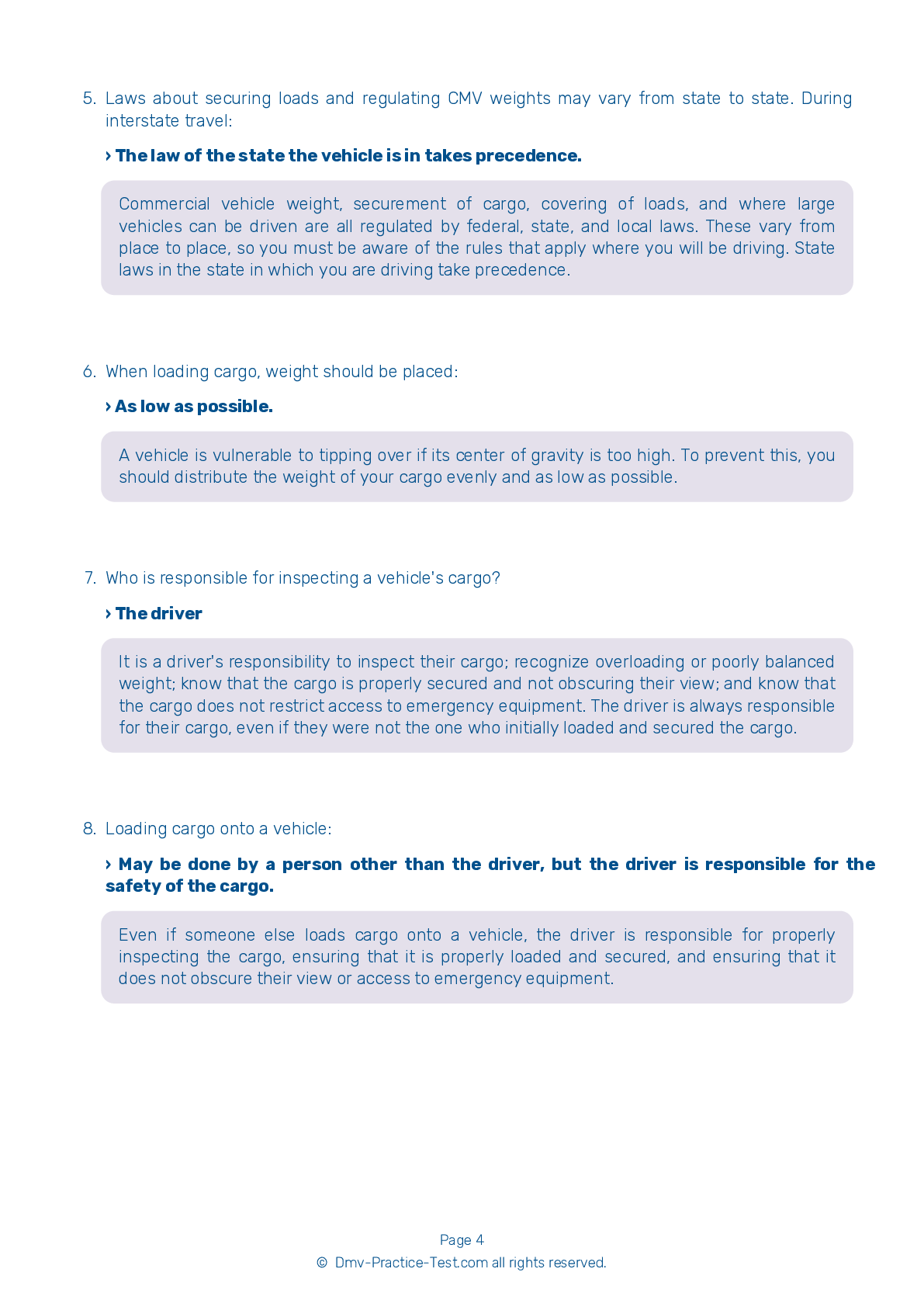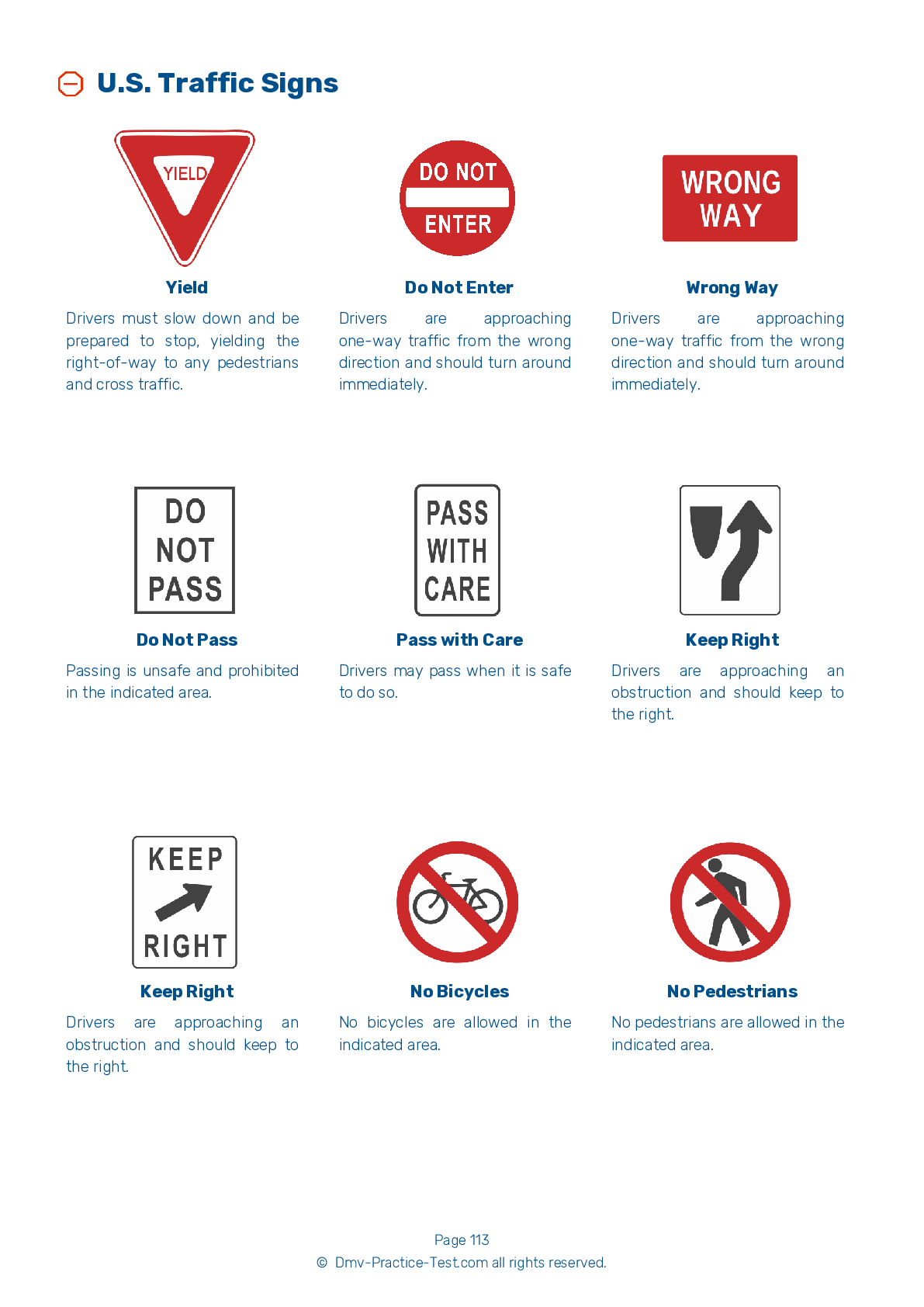Knowledge Test Class A #1
Class A Driving Test | West Virginia 2026 #1 Page 4 of 7
Train for FREE online with our West Virginia class A license test. The official exam test consists of several obligatory parts, with all of them checking your knowledge of different blocks of road rules. If you need to obtain a WV CDL class A permit in 2026, practice as much as possible. Free sample tests published on our website will help you check and improve your knowledge and boost your grades. Please bear in mind that CDL class A requirements may vary from state to state.
50
40
20
22 . Laws about securing loads and regulating CMV weights may vary from state to state. During interstate travel:
The driver can choose which state’s laws to follow.
Commercial vehicle weight, securement of cargo, covering of loads, and where large vehicles can be driven are all regulated by federal, state, and local laws. These vary from place to place, so you must be aware of the rules that apply where you will be driving. State laws in the state in which you are driving take precedence.
23 . If you are being tailgated, you should:
Allow the vehicle to pass.
If someone is tailgating you, it is a good idea to open up the space ahead of your vehicle to make it easier for the driver to pass you. Increasing your speed is not a good idea because the driver may continue to tailgate you at the higher speed, only increasing the danger.
24 . When inspecting cargo, the driver should do all of the following, except:
Ensure that the breakable items are placed under heavier items.
Cargo should be inspected by a driver to ensure that it is properly secured, balanced, and not exceeding weight limits.
25 . When should you check and adjust your mirrors?
Mirrors do not need to be adjusted.
The adjustment of mirrors must be checked prior to the start of any trip.
26 . Which of the following indicates drowsy driving?
All of the above
Indicators of drowsiness while driving include your eyes closing or going out of focus by themselves, having trouble keeping your head up, and drifting between lanes.
27 . When starting the engine as part of the pre-trip inspection, the driver should:
Turn on the heater.
Check your engine during the pre-trip inspection. After starting the engine, you should listen for unusual noises.
28 . During a basic vehicle control skills test, what is considered a look?
A driver glancing over their shoulder to check blind spots
A driver uses a look when they open their door, leave their seated position, and walk to the back of the vehicle to check its position. During the straight line backing exercise, a driver may not exceed one look. During any other exercise, a driver may not exceed two looks.
2026 West Virginia | Frequently Asked Questions
A CDL Class B license in West Virginia allows the holder to operate single vehicles with a gross vehicle weight rating (GVWR) of 26,001 pounds or more, or any such vehicle towing another not exceeding 10,000 pounds. This typically includes buses, dump trucks, delivery trucks, and straight trucks. This license also requires specific endorsements for certain vehicles.
A Class B Commercial Driver's License (CDL) in West Virginia allows you to operate single vehicles with a gross vehicle weight rating (GVWR) of 26,001 pounds or more, or any such vehicle towing a vehicle not in excess of 10,000 pounds GVWR. This includes buses, farm labor vehicles, and trailers.
To acquire a Class B CDL license in West Virginia, you must be at least 18 years old, possess a valid non-commercial driver's license, and pass a vision test. You'll also need to pass written knowledge tests, obtain a Commercial Learner's Permit (CLP), and complete a skills test in the vehicle type that your Class B CDL will cover.
In West Virginia, you must be at least 18 years old to qualify for a Class B Commercial Driver's License (CDL). However, to drive interstate or to carry hazardous materials, you must be at least 21 years old. Please remember, other requirements also apply.
Specific endorsements are not necessary for a Class B CDL license but can be added based on the type of vehicle you plan to drive or the cargo you will carry. For example, passenger (P) or school bus (S) endorsements are required to drive buses. A tanker (N) endorsement is needed for liquid cargo, and a hazardous materials (H) endorsement is necessary for transporting hazardous materials.
The Class B CDL skills assessment in West Virginia includes three parts: a pre-trip vehicle inspection, a basic vehicle control test, and a road test. You'll be required to demonstrate your ability to inspect your vehicle, show basic control by moving your vehicle forward, backward, and turning it within a defined area, and finally, drive on the road in various traffic situations.
Yes, Class B CDL license holders in West Virginia are restricted to operating vehicles with a GVWR of 26,001 pounds or more, or any such vehicle towing another not in excess of 10,000 pounds. They can't operate Class A vehicles without the proper endorsement. Also, to transport passengers or hazardous materials, specific endorsements are required.
Yes, in West Virginia, the written test for a Class B CDL can be taken in languages other than English. However, it is important to note that the Federal Motor Carrier Safety Administration requires all commercial drivers to read and speak English sufficiently to converse with the general public, understand highway traffic signs and signals, respond to official inquiries, and make entries on reports and records.
Yes, West Virginia Division of Motor Vehicles (DMV) provides accommodations for individuals with disabilities taking the Class B CDL written exam. You will need to request these accommodations in advance. This may include providing reading assistance for those with visual impairments or learning disabilities. Contact your local DMV office for specific information on how to request accommodations.
Yes, you can retake the Class B CDL written test in West Virginia if you fail on your first attempt. There's a waiting period of one day before you can retake the test. However, keep in mind that each retest incurs a fee. It's advisable to study thoroughly using the CDL manual and practice tests before attempting again.



